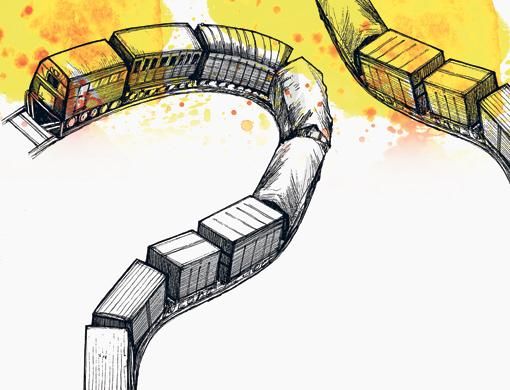It's been 12 years since I've lost touch with the man, who I regard as my mentor, the man, who taught me the essence of reporting. And the essence of being a leader: you must be fair and you must appear to be fair.
So I googled him. What a pleasant surprise.
He was on Facebook. On Twitter. And he was even blogging. The man, who churned out copy after copy on an old, forgotten typewriter, smoking one cigarette after another in the mid-1990s, had moved with the times.
As I read his blogs, I was fascinated. He, after all these years, was still fired by Indian politics and politicians. An acrimonious parliament, fractured alliances and party personalities still get his adrenalin flowing. And I am still bored to tears at the mention of a political party or its manifesto.
But memories came rushing past. So did his words: "You'd better leave," said with a twinkle in his eyes. He would utter that one sentence, and off us reporters would go to cover 30 people dead in a ferry capsize; 17 killed in a building collapse; or a fire that would rage for 32 hours and ravage a market in Kolkata, India.
He was a man we young reporters looked up to he had covered every story you could think of. But we dreaded that phone call from him at midnight because he would dispatch us to some remote hamlet in West Bengal, which no one had heard of or would even care to read about. But he cared.
"Take the local train at 1am, it will reach the village at 5am. Hire a car, drive for 100 kilometres. You will come to a post office, take a right there, drive another 10 kilometres. You will arrive at a market, take a left and you will see the spot. That's where the political killings have occurred."
We were mesmerised. How did this man know so much; almost completely forgetting the ordeal ahead of us. Taking a train in the dead of night to a village in the back of beyond was a story in itself. The railway platforms would turn into beds of sleaze and havens for drug pushers. Every kind of abuse was on display.
I would wonder how he could be such a political animal. Doesn't the stagnant Indian politician make him brain dead?
There are two stories surrounding politicians that have stayed in my mind. One was an election rally in Murshidabad, West Bengal. I heard those same words: "You'd better leave".
So there I was - on a lush paddy field with a grey sky above me, surrounded by tribal farmers, waiting for the venerable Marxist chief minister to arrive and deliver some pearls of wisdom. It was the monsoon season. Yes, the rain came down in sheets, and on time. Our chief minister was fashionably late. He arrived a good hour after the sky had shed every tear.
Tribal drums rolled and our chief minister started bashing the Congress, giving cause for thunderous cheer. Lo and behold! He broke into English! The farmers didn't comprehend a word because all they knew was Bengali!
But the chief minister, educated first in a convent (yes convent) and later at a school run by Jesuit priests, continued in the English he had learnt during the British Raj! Some Marxists, with a presence of mind, decided to clap. A roar followed. The tribals, the young, the innocent and the toothless, clapped in appreciation of his erudition. Politics can be strange ... Stranger when it comes to one lady politician.
She once came to condole families who had lost loved ones in a building collapse. Police were on edge, having to control a tense mob. She descended on the scene only to throw the choicest of epithets at the policemen, adjectives that made hardened street cops cringe. Politics for me is entertainment. Good value.
Ah! There's another captivating political story.
Destination was Purulia, a bleak district of Bengal. It involved a train trip at dark dawn of a cold December in 1995.
An aircraft had air dropped 250 AK-47 rifles, rocket launchers and grenades. The villagers had taken a fancy to them.
Who had dropped them? Who were the end users?
As I read my mentor's blogs, I couldn't help wonder at the futility of Indian politics. Is there a goal? A true manifesto that will wipe out hunger? India has achieved a lot, but the ugly face of poverty and grim social issues continue to pull the country down in an abyss.
Thirteen years ago I was sent to a village to investigate the drowning of a newborn. My mentor had guessed right. A small piece reported in a newspaper was a much bigger story.
It emerged Palani Ghosh, a mother, had given birth to her seventh child, the seventh daughter. Her husband had been ravaged by tuberculosis; he could barely look after his paddy field.
Palani could not feed another mouth - that too a girl. She had to think about the dowry for the six other girls. Police said she drowned the newborn in a pond. I don't know what happened to Palani. Or the six girls, aged between three and 10, who were tending to their cows as I left when evening fell and the village was preparing to celebrate a festival.
A recent report in Gulf News said a drunk father had gambled away his young daughter in Bengal.
Thirteen years on such tales of horror still emerge.
Will Indian politicians address such issues in right earnest?
Will the lot of the girl child improve?
How long will children go hungry?
Politicians must turn platitudes into true pledges if India's children have to go sleep on a full stomach.
Who dropped the 250 AK-47 rifles? It's been 14 years and the politicians don't have answers.
Is Indian politics like a freight train bound for nowhere?










